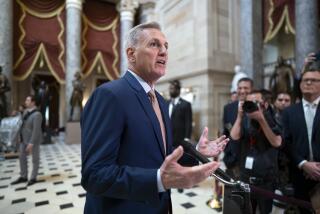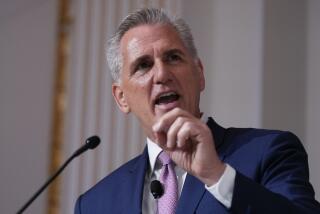Gray Calls for Reagan-Bush Budget to Signal Quick Action on Deficit
- Share via
WASHINGTON — “The world is waiting impatiently for U.S. leadership,” House Budget Committee Chairman William H. Gray III (D-Pa.) said Saturday as he called on President Reagan and President-elect George Bush to submit a joint budget in January “to push the nation rapidly” toward solving the deficit problem.
“Everyone knows that it’s now time to deal with the budget deficit,” Gray said in the Democrats’ response to President Reagan’s weekly radio address.
Instead of waiting for negotiations in the spring between Congress and the new Bush Administration, the Reagan Administration should allow Bush personnel to help prepare the budget before its submission in January to reflect the new President’s wishes, Gray said.
Seen as Starting Point
However, Bush and his top aides have announced no plans to take final responsibility for the last budget document of the Reagan era. Instead, they are likely to use it as a starting point for discussions with Congress in an effort to reduce the huge federal budget deficit.
Meanwhile, Reagan devoted his radio address to a fervent defense of free trade, calling it “one of the key factors behind our nation’s great prosperity . . . . “
He congratulated Canadian Prime Minister Brian Mulroney on his election victory, saying: “Our neighbors have sent a strong message rejecting protectionism and reaffirming that more trade, not less, is the wave of the future.”
Reagan’s praise of free trade was designed to encourage participants in next month’s meeting of trade ministers from the United States and 95 other nations that belong to the General Agreement on Tariffs and Trade, the base of the world trading system.
Setting an Agenda
The ministers will gather in Montreal on Dec. 4 for a four-day meeting to review the Uruguay round of the global trade liberalization talks under way for the last two years and to set an agenda for the final two years.
One of the most controversial areas is the U.S. determination to achieve free trade in agricultural products, which are heavily protected by subsidies and import restrictions in many nations.
Speaking of his hopes for the Montreal meeting, Reagan said: “We want to open more markets for our products, to see to it that all nations play by the rules and to seek improvement in such areas as dispute resolution and agriculture.”
The President also issued a verbal blast at protectionists in Congress.
Protectionism, he said, “is being used by some American politicians as a cheap form of nationalism, a fig leaf for those unwilling to maintain America’s military strength and who lack the resolve to stand up to real enemies--countries that would use violence against us or our allies.”
Warning Shot
A Reagan aide in Santa Barbara, who asked not to be identified, called the tough remarks a case of “firing a shot across Congress’ bow” and said: “Someone in Congress is always thinking of this kind of legislation.”
Gray had no quarrel with the President’s views on trade. “All of us agree that protectionism is not the answer to our trade deficit,” Gray said.
However, he noted that the nation had a $154-billion trade gap last year. “The trade deficit has destroyed jobs and eroded our industrial base,” Gray said. “What the trade deficit fundamentally means is that we spend more than we produce and that basic imbalance results from the budget deficit.”
The Budget Committee chairman said a quick, reassuring response is needed.
“The plunge of the dollar and the tremors in the financial markets right after the election gave a clear signal,” Gray said. After the demonstration by the nervous markets, he said, the United States and the world are eagerly awaiting “the new President’s vision and program.”
Seeks ‘Responsible Course’
“I am, therefore, asking President Reagan and President-elect Bush to join together and begin work now on a budget embodying Mr. Bush’s program to be presented in January.” A joint budget by the current and future presidents “would be the single most effective way to reassure the nation and the world that we are on a responsible fiscal course,” Gray said. The Democrats, who control both houses of Congress, “want to join the new Administration in solving the deficit problem and solving it quickly,” he said.
But the realities of finding a budget compromise will be difficult. The Democrats want to raise taxes to help close the gap between revenues and outlays, while Bush has repeated his campaign pledge against any tax increases.
Staff writer Lee May in Santa Barbara contributed to this story.
More to Read
Sign up for Essential California
The most important California stories and recommendations in your inbox every morning.
You may occasionally receive promotional content from the Los Angeles Times.













